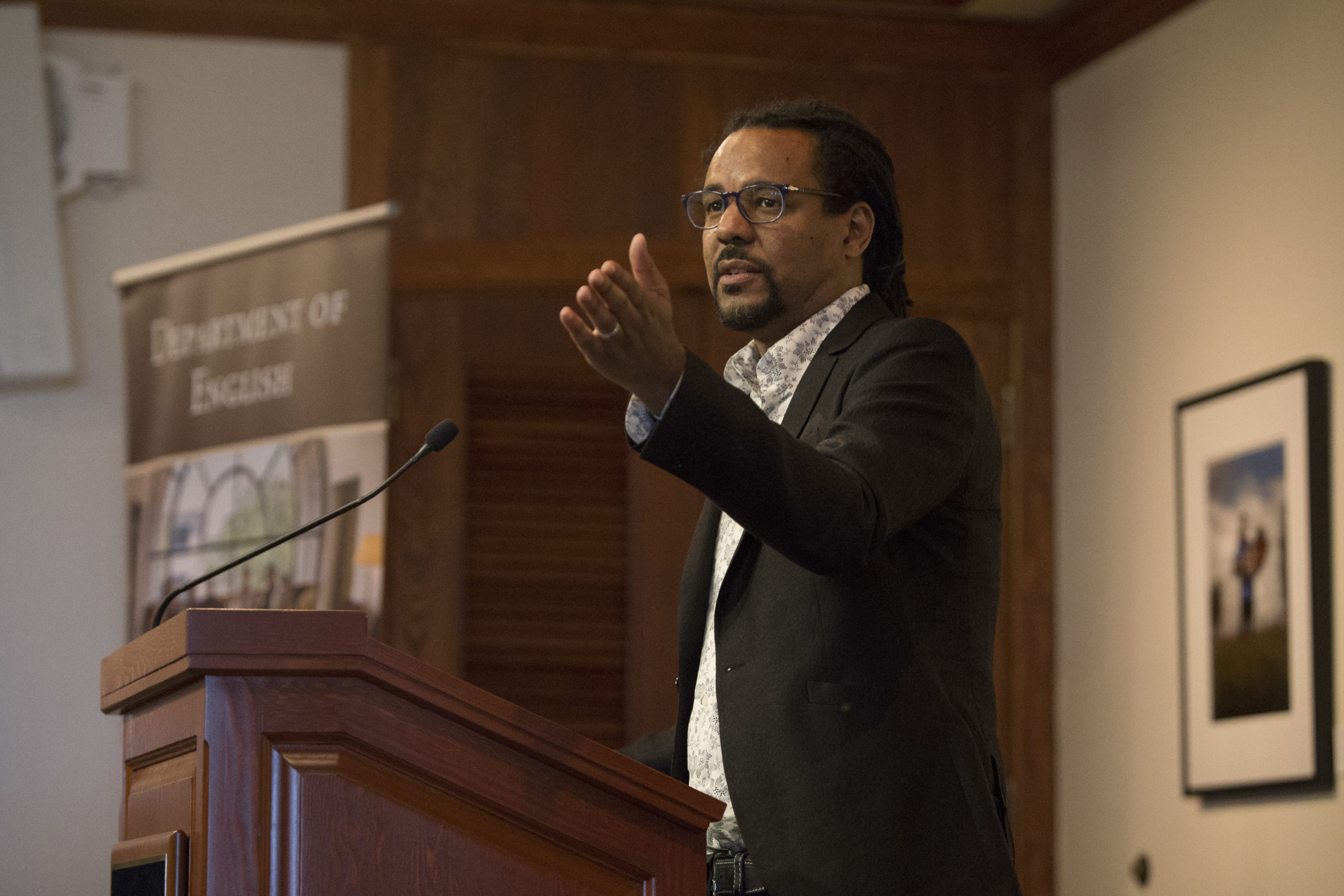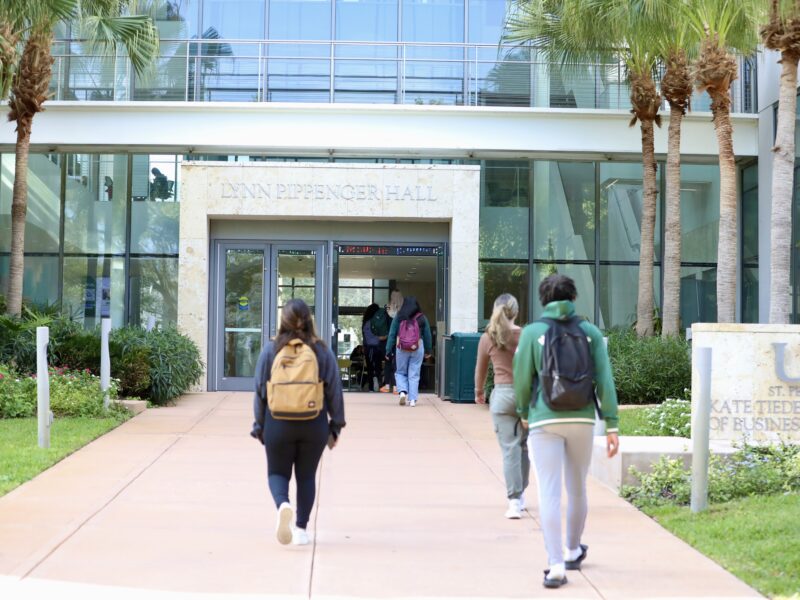Pictured Above: Pulitzer Prize-winning author Colson Whitehead spoke virtually at the Tampa Bay Times Festival of Reading, held Nov. 12-14. Above, Whitehead speaks at an event at Texas State University.
Courtesy of Garrettf67 | Wikimedia Commons
By Mark Parker
The Tampa Bay Times Festival of Reading was a free event held Nov. 12-14. The annual event is in its 29th year, and while it was held on the USF St. Petersburg campus last year, this year it was held virtually.
The festival has consistently featured some of the biggest names in writing, as well as several local writers. Author Colson Whitehead and PolitiFact journalists Angie Holan and Daniel Funke were just a few of the more than 40 authors scheduled to attend.
“There is no hope without drama”
Colson Whitehead has won two Pulitzer Prizes in the last four years, making him just the fourth writer in history to receive this prestigious award twice for fiction. Both wins were for fictitious novels that were based on real events and centered around racial injustice.
The first was for “The Underground Railroad,” published in the summer of 2016. In this critical and commercial success, he imagines the underground railroad network that was used to transport slaves from the perils of the old South to the relative safety of the North as a literal railroad.
The second, and a focus of his interview for the festival, was “The Nickel Boys,” published in August 2019. It is a fictionalized account of the Florida School for Boys, also known as the Arthur G. Dozier School For Boys.
This reform school was in Marianna and operated from 1900 through 2011. While the school was open to all boys who were deemed to need “reforming,” most of the worst atrocities occurred during the Jim Crow era of Florida, when, as Whitehead noted, a black boy could be sent to jail for bumping into a white person while they walked down the street.
While there were plenty of allegations of abuse – beatings, rapes, torture and even the murders of students – throughout the school’s 111 year history, it was not until a failed state inspection in 2009 that the governor ordered a full investigation. Subsequent investigations proved both the historic and recent allegation to be true. State authorities finally closed the school in June 2011.
Due to the high number of unmarked graves and questions about the number of deaths at the school, the state authorized the University of South Florida to conduct a forensic anthropology survey of the grounds. They found 55 burials, most outside of the cemetery, and documented almost 100 deaths.
It was a 2009 Tampa Bay Times article that first shed light on the horrors that took place at the Dozier School.
In 2019, just as Whitehead was finishing up “Nickel Boys,” many more suspected graves were found using ground penetrating radar.
When asked why he would take an incredible story like this and fictionalize it, he said, “I like to be able to pick my characters, then I can have them do what I want.” Although, he also added that for a story like this it was important to stick close to the source material and pay tribute to the men who were there.
“I just wanted the liberty to make them my own kids,” Whitehead said.
Whitehead relayed that for the first time, he fell into a bit of depression upon completing the book. His remedy? Spending a few months playing video games and spending more time with his children.
It was at this time, perhaps during one of his family barbecues he spoke so fondly of, that he realized the ultimate goal is to “improve the social order and be better human beings. The same way that my grandparents and parents who grew up in times of more severe racial discrimination had to hope their grandchildren and children would grow up in a better place.”
“There is no hope without drama,” Whitehead told the audience.
This was not just in reference to the heavy subject matter of his last two novels or the ongoing fight for racial justice, but also in response to the pandemic. He explains that even through dark subject matter or dark realities, there is always this underlying sense of hope that things can and will get better.
Whitehead has recently announced that his latest novel, “The Harlem Shuffle,” is set to be released in September 2021. It is a crime novel based in 1960s New York City, and is a much more lighthearted endeavor than his last two books. Also, a television adaptation of “The Underground Railroad,” produced by Florida native Barry Jenkins, has finished shooting and is set to premiere on Amazon Prime sometime in 2021.
The Facts are the Facts
In 2020, the year of a global pandemic, social unrest, the most divisive election in modern history and general harbinger of bad times, you would be correct to expect that our nation’s fact-checkers have been working overtime to sort through the rampant misinformation that has been propagated.

Courtesy of PolitiFact.com
PolitiFact editor Angie Holan and staff writer Daniel Funke, who is also in charge of sifting through misinformation on social media, took time off from this demanding endeavor to discuss what it is like fact-checking America with attendees of the Tampa Bay Times Festival of Reading.
PolitiFact has been keeping politicians honest since its inception in 2007 as a project of the Tampa Bay Times. Journalists conduct an extensive evaluation of statements made by politicians, government officials, and others involved in U.S. politics, and then assign a rating on their “Truth-O-Meter.” This ranges from “true” for accounts the deem accurate, to “pants on fire” for allegations that are completely false.
What started as a local project has since gone national, including a partnership with Facebook in 2016. In 2018, it was acquired by the Poynter Institute in St. Petersburg, and still has offices here as well as in Washington, D.C.
Holan called this year “like a greatest hits of misinformation.”
The year started off fast with the first COVID-19 cases being reported in January, before doctors and scientists knew much about the virus.
Then, the election came into view.
“This was the most policy-free campaigning I have ever covered,” Holan said. She explains how in the primaries, Democrats were willing to put their ideological differences aside to focus on who was best suited to challenge President Donald Trump.
When it came time for the national campaign, she said, “both campaigns focused entirely on the other candidate’s suitability to be President, their personality, their temperament, and personal attributes. They weren’t comparing tax and health care plans, or the way they might address climate change.”
Which means most often they were fact-checking personal attacks and outlandish accusations, rather than public policy issues.
“Facebook doesn’t tell us what to fact-check,” said Funke, “we choose what to fact-check.”
They then go through an elaborate seven-step research process that ends with two or three other editors checking those results. Once everything is verified to the absolute best of their abilities they publish their findings and it is then up to Facebook to decide what to do with it.
They both lament the perception by many that they are a partisan organization.
To this Holan said, “we’re not trying to antagonize anybody, but we can’t shake the truth in ways to make it more palatable to parts of our audience.
“The facts are the facts.”
They add that they are not naïve enough to believe they are changing people’s minds about a candidate, nor are they trying to do so. They are just trying to find and report the truth so that people can make informed opinions on specific topics.
Holan said, “The truth has intrinsic worth by itself, even if no one believes it.”
To learn more about PolitiFact, visit its website.



